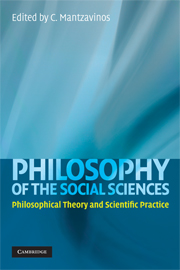Book contents
- Frontmatter
- Contents
- List of Contributors
- Acknowledgements
- Introduction
- Part I Basic Problems of Sociality
- 1 Language and Social Ontology
- Comment
- 2 Shared Agency
- Comment
- 3 The Reality of Group Agents
- Comment
- Part II Laws and Explanation in the Social Sciences
- Part III How Philosophy and the Social Sciences Can Enrich Each Other: Three Examples
- Epilogue
- Name Index
- Subject Index
- References
Comment
De Rerum Natura: Dragons of Obliviousness and the Science of Social Ontology
Published online by Cambridge University Press: 05 June 2012
- Frontmatter
- Contents
- List of Contributors
- Acknowledgements
- Introduction
- Part I Basic Problems of Sociality
- 1 Language and Social Ontology
- Comment
- 2 Shared Agency
- Comment
- 3 The Reality of Group Agents
- Comment
- Part II Laws and Explanation in the Social Sciences
- Part III How Philosophy and the Social Sciences Can Enrich Each Other: Three Examples
- Epilogue
- Name Index
- Subject Index
- References
Summary
In Parallel Lives, Plutarch praises the efforts of Theseus, the legendary Athenian king, to establish and settle a Hellenic commonwealth. Theseus, having made secure acquisition of the country about Megara to the territory of Athens, erected a pillar in the Isthmus and inscribed upon it two verses, one on either side, to distinguish the boundary. One said:
This is not Peloponnesus, but Ionia.
Its counterpart said:
This is not Ionia, but Peloponnesus.
These assertions, graven on a pillar, articulate a fundamental social ontology for the Hellenic world and for anyone since then who has completed a Western education. They prompt for something in the mind and thereby create something in the world. The fable of the pillar is so captivating that its verses have been recited since Strabo (9.1.6), probably well before, flying on repetitive wings across millennia, irresistibly perpetuating themselves through the minds of generations of students.
John Searle, in “Language and Social Ontology,” proposes to clarify what is going on in cases such as Plutarch's story. Searle's assertions are sweeping and they penetrate to the root of the question posed for this volume, namely, how can scientific practice in the social sciences be improved? His essential claim is that Western social thought would be better, or less vacuous, if it attended to the crucial relationship between language and social ontology. Western social thought on the subject of social ontology is, Searle judges, pretty much mistaken from the start, producing pretty much empty conclusions.
- Type
- Chapter
- Information
- Philosophy of the Social SciencesPhilosophical Theory and Scientific Practice, pp. 28 - 40Publisher: Cambridge University PressPrint publication year: 2009



